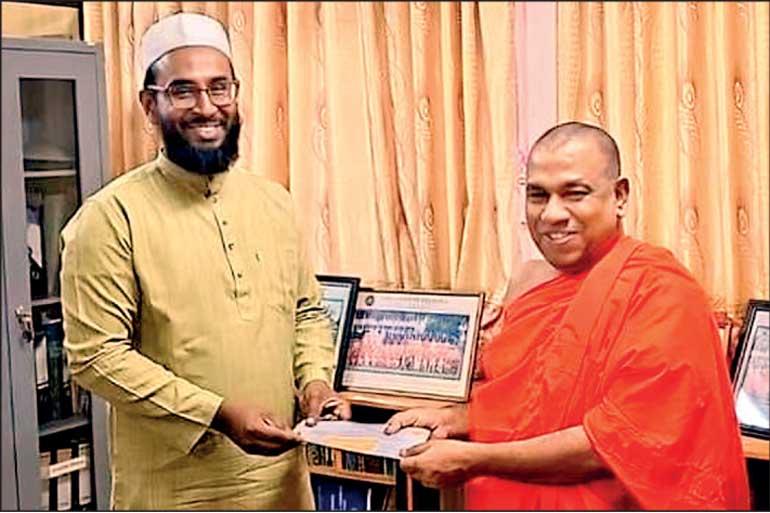Wednesday Feb 18, 2026
Wednesday Feb 18, 2026
Saturday, 17 August 2024 00:16 - - {{hitsCtrl.values.hits}}

University of Kelaniya Department of Pali and Buddhist Studies Head Most Venerable Prof. Makruppe Dhammananda with Maulvi Nasik Farook
This article is based on an interaction between the Most Ven. Professor Makuruppe Dhammananda and Maulvi Nasik Farook and obtained from a narration by Don de Silva.
In a world often divided by religious and cultural differences, stories of unity and understanding stand as powerful reminders of our shared humanity.
The following account is a heartfelt reflection by Maulvi Nasik Farook, a Muslim religious scholar, on his journey through an unexpected experience at the Department of Pali and Buddhist Studies at the University of Kelaniya in Sri Lanka.
His narrative transcends the boundaries of religion, offering a profound insight into the power of empathy, respect, and the unspoken bonds that connect us all. This is not just a story about a scholar navigating through an unfamiliar academic environment; it is a testament to the beauty of harmony in diversity.
Whether you are a student, a scholar, or simply someone seeking hope in these divided times, Maulvi Nasik Farook’s experiences will resonate deeply, reminding us that our true enemy is not each other, but the ignorance that keeps us apart. This is an English translation of the original in the Sinhala language posted by Ven. Prof. Dhammananda in his Facebook page. From Maulvi Nasik Farook, who is pursuing a Master’s degree in Philosophy at the Department of Pali and Buddhist Studies at the University of Kelaniya, Sri Lanka:
“When I first entered the Department of Pali and Buddhist Studies at Kelaniya University, I had a small sense of apprehension. Everyone looked at me differently. Why? Because the media in our country has ingrained nationalism in our hearts. A person wearing a cap has been portrayed as a terrorist, and a monk wearing a robe has been portrayed as a nationalist.
I felt that they might have the same perception. The fear I had at that time was dispelled when my Sinhala brothers gave me the utmost respect that a Muslim Maulvi should receive. I was never treated as a person of a different religion. They saw me as one of their own. Every day, I was given a seat at the front row of the classroom. On the first day, I went to the section reserved for the monks to have my meal. The person in charge of serving food refused (he didn’t know that I was a Maulvi; now we are good friends. He didn’t recognise who I was, which taught me that ignorance is our enemy). Now, we understand each other well.
A monk who understood my vulnerability at that time bought me a meal parcel. At that moment, I realised I was not alone. Words cannot describe the joy I felt at that moment. From that day on, we all accepted alms together as Sri Lankans.
Some days, the monks would even bring lunch for me. I was never left alone when going to eat. It was truly amazing. This warmth, this love, this sense of brotherhood had been hidden between us all this time. How many things might still be hidden between us? After understanding each other, we didn’t divide ourselves by religion or ethnicity; we united as humans.
This brotherly love was fostered by Kelaniya University.
On some occasions, the head of the department looked into my well-being, checking if anyone was treating me differently. Why? Because they didn’t want my heart to be hurt in any way. I am greatly indebted to the head of the department. Without separating me as a Muslim, they ensured I was awarded the same scholarships as everyone else. (If those who label monks as racists could spread this message in society, how great would it be?)
I can’t find the words to describe the brotherly love, connection, and relationship I have with the Buddhist monks and other brothers and sisters. During the exam period, I needed to pass the Master’s exam somehow, and the monks and brothers and sisters selflessly nourished me with knowledge. I am truly grateful to them.
Even now, at least once a week, you all call me to ask how I am doing. Isn’t this how it should be? If I hadn’t come there, you wouldn’t have known about me or my religion.
Likewise, I wouldn’t have known about you or your religion. We understood ourselves by associating with each other. We always thought we were at odds because we were swallowing the lies of politicians. We blame every racial issue in Sri Lanka on politicians. No, there is an enemy more dangerous than them. It is ignorance.
Inter-religious studies is a subject that is important for every Sri Lankan. If the Government took steps to make this subject mandatory in every school, we could eradicate ignorance, racism, and religious extremism from our country. We could raise a disciplined society that respects other religious customs and practices with honour in the future.
Where did we go wrong?”
Note: The Harmony page was initiated six years ago to highlight the good in this world which often gets lost in the onslaught of bad news portrayed often on mainstream media across the world. We wish to be a catalyst for the glory of an earth of forests, non-polluted waters, unpoisoned soil, abundance, peace, freedom, love and poetic, musical and artistic beauty in all its forms. If there has to be criticism that is seen as the role of media, our goal is for it to be constructive and inspiring but not damning. The Harmony page upholds the salient truth that there is goodness is every heart and we work towards seeking out and amplifying that which is child-like and non-corrupted which is alive in every human heart irrespective of worldly conformity.